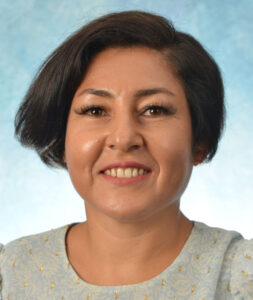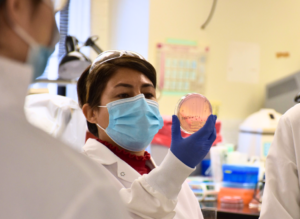
Leila Vafayi is a first-year student in the Division of Clinical Laboratory Science, located within the UNC School of Medicine’s Department of Health Sciences. Leila is a nontraditional undergraduate student who, despite multiple international moves and setbacks along her higher education journey, is determined to fulfill her goal of working as a clinical laboratory scientist.
Leila is Iranian and, following her university education in Iran, was interested in attending medical school and studying genetics. However, she was not given medical school as an option for her post-graduate education, so she instead went on to receive a master’s in chemistry and work in the university’s lab as an instructor for nearly a decade. She enjoyed her work but was interested in transitioning into a clinical laboratory setting to be more involved in healthcare and patient care.
Starting Over in North America with One Goal in Mind
When Leila emigrated from Iran to Canada, her interest in clinical lab work was greater than ever. However, the healthcare system in Canada did not allow her university lab teaching experience to translate into a clinical role; if she were to pursue her dream, Leila would need to return to school full-time for four years to earn a new degree. She accomplished this daunting and somewhat frustrating task with her goal of clinical lab work as her motivation and did so while taking classes entirely in French – an entirely new language for Leila.
Unfortunately, Leila encountered additional challenges with finding work once she and her husband moved to Chapel Hill. Her new degree did not hold the same weight in the United States as it did in Canada, and Leila was again faced with the decision of whether to return to school to pursue her dream career.
The process of being admitted to UNC as an international student, especially one with primary degrees, was challenging and at times confusing for Leila. However, she persevered and received a high score on the TOEFL exam, took prerequisite courses and was finally admitted to the university. She entered the Clinical Laboratory Science program in Fall 2022 and was immediately met with a warm welcome and support from the faculty.
“During orientation, Dr. Beck told all of us that we were not alone, and that faculty was there to support us,” said Leila. “I didn’t believe them at first, but time and time again it has proven to be true. The professors are amazing.”
Hard Work and Faculty Support are Ingredients for Success
Leila has been especially appreciative of faculty and peer support as she navigates personal challenges in addition to her schoolwork. “My home country has been experiencing many issues and hardship this year, and I have been worried about my family and have needed to miss class on occasion,” said Leila. “My professors checked in on me before I even had a chance to reach out to them, which is something I haven’t ever seen during my many years in school. I am very grateful to be their student and am grateful for their compassion.”
 Leila notes many differences between programs she has been a part of in the past and the Clinical Laboratory Science program at UNC. “As a student in Montreal, we weren’t allowed to ask questions, so at first I didn’t know if I should ask questions in this program,” said Leila. “Now, I know I can ask – any time a student asks a question, our professors answer with kindness, which I think is so important.”
Leila notes many differences between programs she has been a part of in the past and the Clinical Laboratory Science program at UNC. “As a student in Montreal, we weren’t allowed to ask questions, so at first I didn’t know if I should ask questions in this program,” said Leila. “Now, I know I can ask – any time a student asks a question, our professors answer with kindness, which I think is so important.”
Additionally, Leila notes that she enjoys being a part of a large campus, and despite the program being challenging, she is happy and motivated to continue. Her goal of working in a clinical laboratory setting is closer than ever, and she focuses on her “why” every day in class and lab – she wants to help people.
Leila just finished her first year in the program, and her second year will include clinical time in a hospital setting.
“There’s always something good in the lab,” she said. “When we can help somebody cure or treat disease, or help the doctors figure out a diagnosis, it’s a great feeling. And when we discover something that isn’t good for the patient, it’s still a rewarding feeling to know that we have impacted their care.”